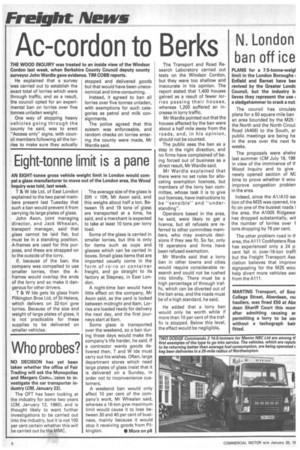Eight-tonne limit is a pane
Page 6

If you've noticed an error in this article please click here to report it so we can fix it.
AN EIGHT-tonne gross vehicle weight limit in London would compel a glass manufacturer to move out of the London area, the Wood Inquiry was told, last week.
T & W Ide Ltd, of East London explained to the two panel members present last Tuesday that such a ban would prevent it from carrying its large plates of glass.
John Axon, joint managing director, and Jack Whealan, transport manager, said that glass cannot be laid flat, but must be in a standing position. A-frames are used for this purpose, and these are strapped on to the outside of the lorry.
If, because of the ban, the company was compelled to use smaller lorries, then the Aframes would overlap the ends of the lorry and so make it dangerous for other drivers.
T & W 1de gets its glass from Pilkington Bros Ltd, of St Helens, which delivers on 32-ton' gvw lorries. Because of the size and weight of large plates of glass, it is not practicable for these supplies to be delivered on smaller vehicles. The average size of the glass is 20ft x 10ft, Mr Axon said, and this weighs about half a ton. Between 15 and 19 tons of glass are transported at a time, he said, and a merchant is expected to take at least 10 tons per lorry load.
Some of the glass is carried in smaller lorries, but this is only for items such as cups and glasses which can be carried in boxes. Small glass items that are imported usually come in the form of ro-ro or container freight, and go straight to its factory at Stepney, in East London.
A night-time ban would have little effect on the company, Mr Axon said, as the yard is locked between midnight and 6am. Lorries are loaded 'ready for delivery the next day, and the first journeys start at 6am.
Some glass is transported over the weekend, so a ban during those days would make the company's life harder, he said. If a contractor wants goods delivered then, T and W Ide must carry out his wishes. Often, large department stores which need large plates of glass insist that it is delivered on a Sunday, in order not to inconvenience customers.
A weekend ban would only affect 10 per cent of the company's work, Mr Whealan said, whereas a 16-ton gvw maximum limit would cause it to lose between 30 and 40 per cent of business, mainly because it would stop it receiving goods from Pil kington. • More on p8
























































